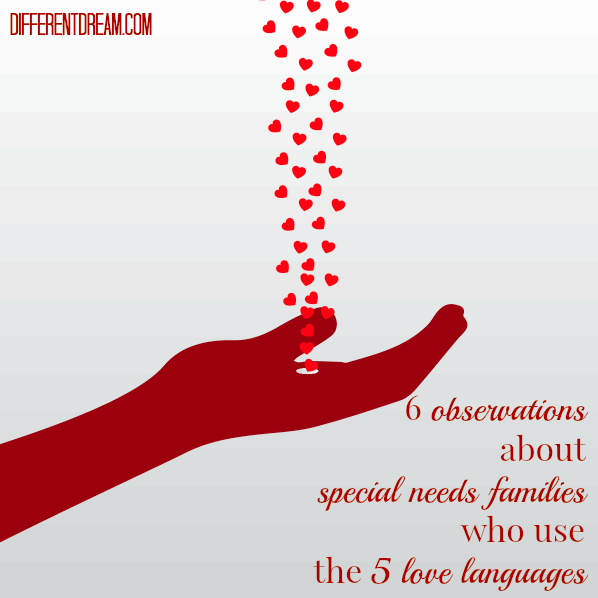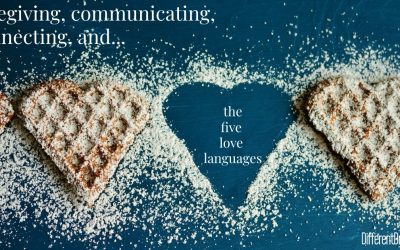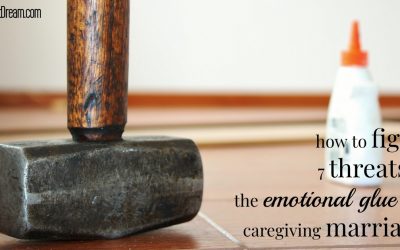An Update on the Special Needs Love Languages Book

An update on the special needs love languages book is a fitting way to usher in February, the month known for romance and love. I want to share what’s happening during interviews as Dr. Gary Chapman and I collaborate on this special needs love languages book. Hopefully, these 6 observations about parents raising kids with special needs provide Different Dream readers with a glimpse at what’s going on.
- Interviewing families is fascinating. Since the new year, 13 families have graciously shared stories of how they use the 5 love languages with their spouses and with their children, both kids with special needs and those who are typically-developing. The stories they tell about how the 5 love languages help them fill their spouses and children’s love tanks are an encouraging affirmation of the elegant simplicity and power of the love languages. I’m convinced that the 15 scheduled interviews yet to be completed will confirm this observation.
- Parents of kids with special needs are keen observers. They know their children’s love languages, even those of non-verbal kids, because they watch their kids behaviors with systematic intentionality. What these parents have described will help many other families determine their kids’ love languages.
- Parents speak the love languages to their kids with special needs in creative ways. Once they know their kids’ languages, they devise innumerable ways to determine their children’s love languages and to speak love to their kids. And they show their children’s doctors, therapists and teachers how to connect with their kids, too.
- Parents love their typical kids to the moon and back. They worry that their children without special needs don’t get enough attention, that they become the unintentional sacrifice at the altar of special needs. Many of them feel that using the love languages to fill their typical kids’ love tanks is the best way to remediate this circumstance. Many of them also say that their typical children have no fear of people with disabilities and special needs, but deep compassion for them.
- Spouses have ingenious ways to speak love to one another. As a rule, parents of kids with special needs don’t have much money or time. So during each interview, I ask parents to describe inexpensive and easy ways they’ve devised to speak their spouses’ love language. Honestly, this is my favorite part of each interview because the ideas are so wonderful. I can’t wait to share them in the book.
- Special needs families are persistent. They don’t give up. They know they may be the primary caregiver for their adults children as long as the parents are alive. So they are constantly looking for ways to better the lives of every member of their family by keeping one another’s love tanks full.
Do you like what you see at DifferentDream.com? You can receive more great content by subscribing to the quarterly Different Dream newsletter and signing up for the daily RSS feed delivered to your email inbox. You can sign up for the first in the pop up box and the second at the bottom of this page.
By Jolene
Jolene Philo is a published author, speaker, wife, and mother of a son with special needs.
12 Comments
Trackbacks/Pingbacks
- The Grief We Live with as Parents of Kids with Special Needs | Different Dream Living - […] appearance occurred while I completed one of the final parent interviews for the book I am co-authoring with Dr.…
- #32 The Ten Commandments of Multigenerational Living - Home Again Podcast - […] Finally, here’s a link to more information about Jolene’s Love Languages project: An Update on the Special Needs Love…
Submit a Comment
Subscribe for Updates from Jolene
Related Posts
Fostering Communication and Connection Between Caregiving Parents
Fostering communication and connection between caregiving parents gets a little easier with these love language ideas.
The Sharing Love Abundantly Online Study is Coming Your Way
Discover how caregiving families can use the love languages during the Sharing Love Abundantly online study. Check out the details here.
Threats to Caregiving Marriages and How to Fight Them
Spouses raising kids with special disabilities can fight threats to caregiving marriages. Here’s how the 5 love languages can help.






Hi Stephanie, I’m so glad the workshop and book were so helpful. I appreciate your offer to help with the Love Languages book, but the manuscript is with the publisher, on the way to being released in August, 2019. I’ll be at Inclusion Fusion Live this April and will do a workshop about the Love Languages for families like ours. Maybe we can touch base there again. Jolene
I would love to help in any way I can. We met briefly at Inclusion Infusion LIVE! last year after your workshop and it helped me so much. Your book “Does my child have ptsd?” was SOOOO eye opening! I can’t wait to read this new book on love languages!
My oldest is almost ten with ASD, ADHD, OCD, and anxiety. It has been quite the journey of working through things with him but ALSO trying to raise two other neurotypical children to love their brother, understand him, and show him love in various ways. Thank you for your ministry!
Thank you Marnie!
Thank you, Susan! I’ll contact you via private email. Jolene
I would be glad to help as well. I have three children of which two are special needs. My husband and I have been married now for 19 years. The five love languages was a bible study for us many years ago and has been a key part in both the challenges of marriage as well as those presented by autism.
So excited about this. Thank you for all of your amazing work! Can’t wait to read it!
Jolene, I lost the email you sent. I think I had a small helper in my email. I have reached out on your main contact page with times that would work for us. Sorry about the lost email and late reply.
I want this book! ❤
Thank you for that vote of confidence Maree. I’m excited about the project, too. Jolene
Thank you, Cheryl. I will contact you with details through email. Jolene
What a wonderful book. I can’t wait for it to come up. I am a big fan of the love languages. They have been instrumental in reaching my child with special needs. Her love language is not mind so I have to work at it.
Jolene, I would love to help in this area. I love the love languages and they have helped me while raising my 5 children, 3 of whom have special needs. My husband is amazing in speaking my love language and I’m so grateful for it. I also have a typical daughter who seems to be able to connect with each of her siblings differently. She is a natural teacher and incredible at reading the needs of her siblings. I would love to speak with you if you need more interviews.